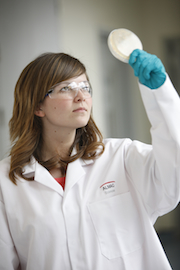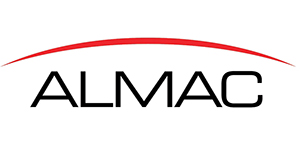Among their many uses, biocatalysts have become key tools for chemists looking for robust, scaleable processes to produce chiral compounds. Almac’s head of biocatalysis, Dr Tom Moody, looks at the development of biocatalysts and their use in API production
The chemical industry continues to lower costs and the need for economic, robust, scaleable and reliable processes has become paramount. Synthesis of chiral APIs and intermediates has resulted in process chemists tuning their skills at the interface of chemistry and biology and indeed embracing biocatalysts and biocatalytic processes in organic synthesis. This paradigm shift has resulted in biocatalysis becoming the work-horse of the chemist’s tool-box for chiral chemistry.
Northern Irish company Almac has embraced the technology over the past five years and business has expanded from its 2009 launch with the sale of six enzyme screening kits, to the current supply of hundreds of kilograms of chiral intermediates for drug substance manufacture, regular enzyme supply to speciality chemical companies and continued growth of its screening kits offering.
Biocatalysis is increasingly recognised as an mainstream solution for solving complex chemistry problems thanks to its rapid implementation, economic benefits and ‘green’ reputation. Almac’s growth in this area was further enhanced last year through a US$4m r&d investment. The next step for the business has been the launch of its selectAZyme brand, which conveys Almac’s wide biocatalysis offering.
Almac is providing a diverse A–Z range of enzymes, including reductases, transaminases, hydrolases, nitrilases and many others. In collaboration with customers, the company selects the optimum enzyme to provide an efficient and cost-effective process. These enzymes are used in applications from medicinal chemistry to full production and in the manufacture of speciality chemicals. The key strength of enzymes is the high selectivity of the chemical reactions they catalyse and selectAZyme is the technology of choice for Almac if chirality is involved at scale-up.
Enzymes have numerous advantages in this field. One of the main benefits is their ability to discriminate between quite subtle differences in shape and functionality, either within a given molecule or in a mixture of molecules. This allows selective chemistry, for example regio-selectively transforming a single functionality (out of several) in a single molecule or effecting the biotransformation of one isomer in a racemic mixture, allowing its separation into the component isomers. More importantly, enzymes have been used very successfully in the scale-up of asymmetric processes, particularly in the area chiral alcohol and chiral amine production.
Combining biocatalysis with synthetic chemistry and gram-to-tonne manufacturing capability has provided a boost to what Almac has to offer to customers. Development timelines from identification of a selectAZyme biocatalyst to actual scale-up and preparation of chiral product is often less than conventional chemistry. Typical timelines are shown in Figure 1.
A typical project for a ketone reduction is shown in Figure 2 and was initiated with selectAZyme platform screening. Having identified a carbonyl reductase (CRED) biocatalyst from the screen, the bioreduction of the beta-keto ester was developed using a two-enzyme selectAZyme system. The bioreduction was performed in five volumes of buffer and one volume of DMSO to aid in the mass transfer of the hydrophobic ketone into the aqueous media and subsequent interaction with the enzyme. Just 1g of biocatalyst was sufficient to produce 1kg of the product.

Figure 2: The CRED reduction of a hydrophobic ketone using the selectAZyme platform
This process was stress-tested, revealing the biocatalyst was able to tolerate a pH range of 6.3 to 7.8 in a temperature range of up to 38°C. The pH was adjusted continuously using an external circulation loop, adding caustic by an automated pump. The process was developed to run at hundreds of kgs. The selectAZyme CRED used in the this process is currently being evolved using directed evolution. The evolution is targetting the ability of the CRED to tolerate iso-propyl alcohol, therefore converting the bioreduction to a one enzyme system and hence making the process more economic.

Almac has dedicated labs for pilot scale fermentation, molecular and microbiology
Metabolite synthesis is another tool within selectAZyme’s service offering that provides access to both oxidative and glycosylated products. Almac has implemented state-of-the-art biocatalytic technology for rapid metabolite synthesis, isolation and structural identification. The company has developed recombinant P450 technology for accessing metabolites at mg through to hundreds of gram amounts. These enzymes, which mimic human P450 systems, provide a powerful tool for accessing metabolites rapidly.
The marriage of microbial and recombinant enzymes is a real powerhouse in accessing difficult to synthesise metabolites. The scale-up capability allows Almac to rapidly take ‘hits’ from conception to gram delivery, as and when the customer requires the products. In addition, the company can also supply radiolabelled versions of these metabolites utilising its in-house Isotope Chemistry group.
SelectAZyme offers cost-effective and green solutions to difficult chemistry problems and can be scaled to multi-tonne in timelines comparable with traditional chemistry and is now the preferred chiral tool for Almac. The use of hydrolase, oxidoreductase and transferase enzymes has resulted in the fast delivery of high quality chiral products that would not be achievable using other conventional techniques.
Biocatalysis is a now prominent technology within Almac and is certainly aiding in its future success for the rapid supply and delivery of chiral intermediates and fine chemicals.

